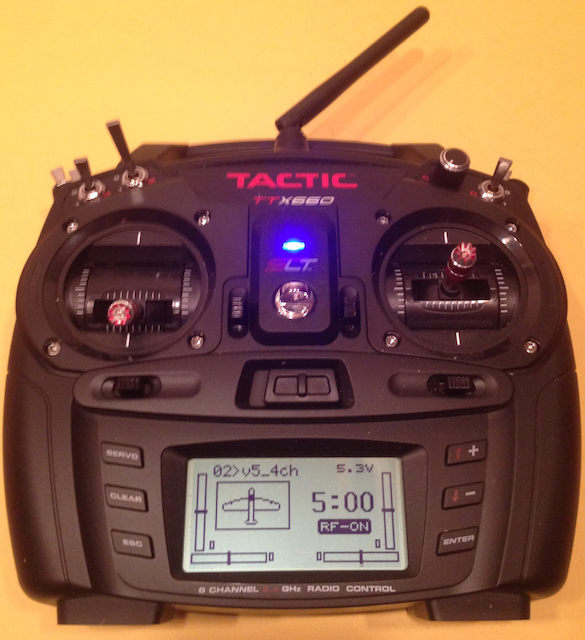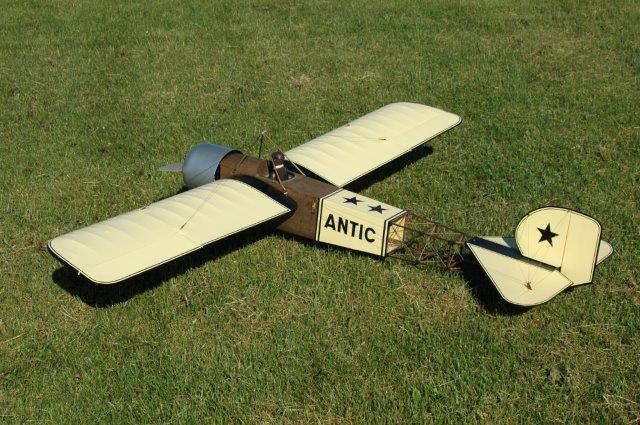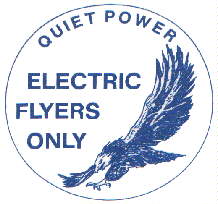 |
Flying High With Electric Power!
The Ampeer ON-LINE!
Fly the Future - Fly Electric! |
|---|
Site Table of Contents
| President: | Vice-President: | Secretary-Treasurer: |
| Ken Myers | Keith Shaw | Rick Sawicki |
| 1911 Bradshaw Ct. | 2756 Elmwood | 5089 Ledgewood Ct. W. |
| Commerce Twp., MI 48390 | Ann Arbor, MI 48104 | Commerce Twp., MI 48382 |
| (248) 669-8124 | (734) 973-6309 | (248) 685-7056 |
 | ||
| Board of Directors: | Board of Directors: | Ampeer Editor |
| David Stacer | Arthur Deane | Ken Myers |
| PO Box 75313 | 21690 Bedford Dr. | 1911 Bradshaw Ct. |
| Salem, MI 48175 | Northville, MI 48167 | Commerce Twp., MI 48390 |
| (313) 318-3288 | (248) 348-2058 | (248) 669-8124 |
| Saturday, August 1 EFO Meeting: Midwest RC Society 7 Mi. Rd. Flying Field Time: 10:00 a.m.
Place: Midwest RC Society 7 Mile Rd. Salem Township, MI Phone: 248-669-8124 Everyone with an interest is WELCOME Proof of AMA membership required to fly | ||
| Tactic TTX660 Review Update and Why I Just Purchased a New One Ken reviews this radio transmitter and tells why he bought one. | A Vintage Antic Flies Joe Hass discusses the 31 year plus journey from build to air. |
| The January 2020 EFO Meeting The happenings at the January 2020 EFO Meeting | |
By Ken Myers
Note: My original review, of a borrowed TTX660 transmitter, appeared in the December 2017 Ampeer. The three video clips, linked in the original article, no longer exist. I also created a comparison chart for the TTX650 and TTX660 that is linked in the article. That chart is linked to here as well. Introduction: My first review of a Tactic radio, an original TTX650 computer style transmitter, appeared in the July 2013 Ampeer. In that article he reviewed that version of the Tactic transmitter. He received his original Tactic TTX650 transmitter and a TR624 single antenna receiver on May 9, 2013. Over the years, there were several follow up articles about Tactic radios, which use the SLT protocol, in the Ampeer. From Joe Hass, via email Joe Hass shares his positive experiences using the Tactic TTX650 transmitter and TR624 receivers. By Ken Myers Ken Myers presents follow-up information on this transmitter and receiver. The article also includes how to set up a throttle cut safety switch. From Roger Wilfong via email Roger Wilfong provides information on a better way of setting up a throttle lock on this transmitter. By Ken Myers Ken reviews this new 8-channel transmitter and compares it to the Tactic TTX650. From Dave Stacer via email Dave Stacer takes apart his Tactic TTX600 and shares what he 'found' in photos. By Ken Myers Ken Myers describes how he found the wing cube loading of the Flyzone Tiger Moth and updates the performance of the Tactic TTX850 in the all metal Ultimate Soccer Arenas. My original TTX650 transmitter quickly became my "daily driver", replacing the Hitec 2.4GHz unit that I was using at that time. Toward the end of April 2020, I had a problem getting a FliteTest 35A ESC to arm. I had never had this problem before with the many different brands of ESCs that I have used with the TTX650 transmitter. The ESCs that I've used included several versions and iterations of Castle ESCs, Jeti, Cobra, Scorpion and some "off" brand ESCs that came in some PNP type planes. I spent quite a bit of time diagnosing the arming problem and found a couple of solutions online. The solutions that I found appeared to work, but I noticed that my throttle trim was getting "wonky". It would indicate, on the transmitter screen, that it was moving up, increasing, but it was sometimes hesitant about moving down. "Finally the throttle trim, on my original Tactic TTX650, absolutely refused to move down, or lower the throttle setting, at all. I contacted Tower Hobbies, which is now part of Horizon Hobbies, about getting a replacement trim lever. Their response was to send in the transmitter and they told me how to do that. Because it was convenient, I had previously started a spreadsheet to archive the settings of the planes that I had on my original TTX650. The first thing that I did was to finish up that spreadsheet with all 20 planes that I had on that transmitter. Actually, three of the memory positions were planes that I no longer have, so only 17 of the 20 model memories were in use. I like to have two of the "main" and most useful things that I use in modeling whenever possible. I discussed that in my article "The Power of Two" in the April 2018 Ampeer. You just never know when one will stop working, except that it will be at the most inopportune time! (Like the beginning of the 2020 flying season, maybe?) My alternate TTX650, which I had used only as a buddy box, was still working just fine at that time. For another backup, I also had the Jumper T16 transmitter, which can transmit the SLT protocol. Unfortunately, at the time of this writing, I am still not comfortable with the Jumper T16, and now the Jumper T16 is discontinued. I had not yet done any "outdoor" flying with it. Also, the constant updates of OpenTX, the firmware for the Jumper T16 operating system, and the constant updates for the multi-module, were driving me "bonkers". My little 787 indoor flyer would only work on an early version of the multi-module firmware, but the SLT protocol would not work correctly on that version. On the latest version of the multi-protocol module firmware, the SLT protocol seems to be working okay, but now it won't bind to the 787 indoor flyer. I'm pretty sure that the Jumper T16 radio will never become my "daily driver". When I ordered the TTX660 on Sunday, May 3, I wanted to get two Tactic TR625 dual antenna receivers to go with it. They did not have the two pack available and I could only order one single TR625 receiver as the increment button on the TR625 page would not increment. It now appears that I got the last one they had in stock at that time. Even though the Tower Hobbies' Website indicated a Late June arrival for the TR625 two pack, I incorrectly thought that this just might be the end of the line for Tactic radios. (See the following.) I found some great news on JUly 12, 2020. The Tactic TR625 and TR624 receivers were indeed back in stock. This calmed my fears that with the takeover of Tower Hobbies by Horizon Hobby, that the Tactic radios could be "on the way out". I really, really like the Tactic transmitters and receivers, and will continue to use them as long as they exist. It should also be noted that Horizon Hobby has stopped selling the Tower Hobbies brand radio system that was based on the Tactic radios and used the SLT protocol. A check on the Tower Hobbies Website on June 21, 2020 showed all of the TR624 and TR625 receivers out of stock with an expected delivery date of early July. The ordered Tactic TTX660 transmitter, $159.99, and the TR625 receiver, $24.99, were shipped on Monday, May 4. Tower Hobbies/Horizon Hobby also collected Michigan sales tax on the purchase. Tower Hobbies posted a less than useful YouTube video about the TTX660 on May 25, 2017. It is the same one as on the Tower Hobbies' Website for this transmitter. In the resources section of the Tower Hobbies' Webpage for this transmitter they have two different links to the 2017 copyright manual for the TTX660. One link retrieves the PDF version of the manual from the Hobbico Website, while the other links to the same manual on the Horizon Hobby Website. The TTX660 transmitter and TR625 arrived about noon on Friday, May 8. I opened the TTX660 box and removed its provided paper manual and laid it beside the paper manual for the TTX650. On Page 4 of the TTX660 manual there are photographs of the transmitter front and right side showing its dial control position, which replaced the 3-position switch C of the TTX650. The Page 4 photos of the TTX660 did NOT indicate the position of the slider controls on the rear of the transmitter. The first step noted on page 7 of both manuals tells how to adjust the stick tension and change to the provided ratchet-type slide from the smooth-type slide bar. Needle nose pliers were used to remove the AA battery box connector so that the battery box could be removed. Two different size Phillips screwdrivers are required to remove the screws in the rear cover. I carefully removed to the two small screws in the handle and put them into a bowl for safe keeping. Next I loosened the four screws in the transmitter back. I shook the four, larger, recessed screws onto the floor, so as not to lose them. All six screws were placed in a bowl for safe keeping. The rear cover was separated from the front, but the wires connecting the flight simulator connector were left connected. To my surprise, the ratchet-type slide bar was already in place on the throttle, so I only needed to adjust the throttle stick tension to my liking as well as the aileron stick tension. The six screws were returned to their positions and a needle nose pliers was used to return the battery box connector through its hole in the back of the battery box. The stick height was adjusted to my liking. After adjusting the stick height, I noted that the two slider controls, located on the rear of the transmitter had a nice, firm center detent, but that there is no detent on the dial control on the front of the transmitter. The four provided alkaline AA cells were installed in the battery box while observing the correct polarity and the battery box cover was put into position. On a personal note, I prefer to use alkaline AA cells in my transmitters whenever possible and I carry extra with me in my car. Others may argue that a AA battery box is not the best way to connect a battery to something, and they certainly do have a strong argument for believing that. I created a new backup up spreadsheet for the TTX660. The SYSTEM SETUP Menu has an entry for BRIGHTNESS that the TTX650 did not have. I entered the following:
I find the LCD screen to be completely usable, for me, with the contrast set to 0 and the brightness turned off to extend the battery life. When the transmitter is turned on, it briefly notes the firmware version as 2.005. This was important to note because Tower Hobbies had posted a Tech Notice: Notice 1 that indicated that "Tactic TTX660 computer transmitters prior to firmware version 2.005 have a programming error". There is some conflicting information on page 12 in both manuals where it notes that the Alkaline Default and Recommended is 4.00V, yet the Default was set to 4.7V on the TTX660 that I received. Since I had previously set up the plane that I was starting with on the TTX660 on both of my TTX650 transmitters, a Simple Cub version 5 with no ailerons, I knew how to set up it up on the TTX660 transmitter, as the menus are identical. If you use an ESC for throttle, you must reverse channel 3, the throttle channel. First, the model type is selected. On page 13 of both manuals there is a graphic, near the bottom of the page, that shows the MODEL TYPE choices as AIRPLANE AND HELICOPTER. When MODEL MANAGEMENT is selected and then Type:, the TTX660 shows the following: 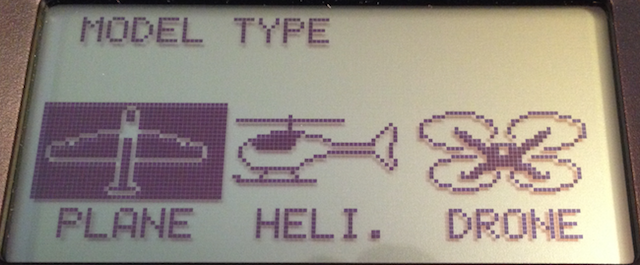 The only information about "drones" is in three paragraphs on page 36 of the TTX660 manual, and that information is not included in the TTX650 manual. I fly only very simply set up airplanes, and the set up follows the same procedure as for the TTX650. I followed the procedure in Roger Wilfong's "A Better Way to Set Up the Throttle Cut Feature on the Tactic TTX650 to be Used as a Throttle Lock" to set up the throttle cut. THROTTLE CUT
Next I set up the countdown timer to count down when the throttle stick was "on" and stop when the throttle stick was in the full down position, or off. After seven flying seasons using the Tactic TTX650, I finally figured out how to do this correctly! On some of my plane setups, the timer, using the throttle stick to switch it on and off, worked all of the time with no problem. On a few planes, the timer would work sometimes and not work sometimes. I'd look at the set ups that were working all of the time and those that were only working some of the time and I could find no differences. While setting up the TTX660, I believe I found a solution to making it work 100% of the time. I also discovered why the working and sometimes not working throttle countdown timers looked to be set up the same. Enter the TIMER. 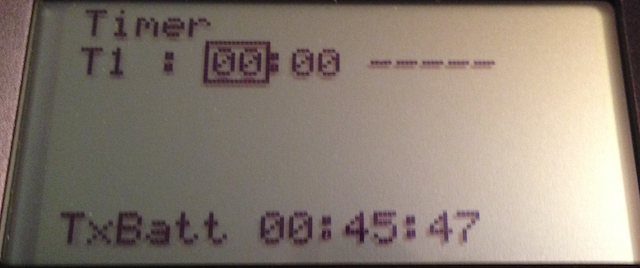 Enter a time that you may want to use on a maiden flight. (Any time of a few minutes will do for now, as only actual flight testing can provide the "real" time that you want to use.) Move the cursor to the 5 dashed lines (- - - - -), press the ENTER key and move the throttle stick. The START/STOP screen appears. 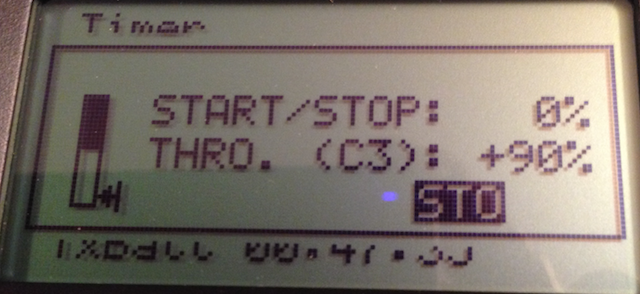 Pull the throttle down until about +90% is showing on the throttle gauge on the left side of the screen.
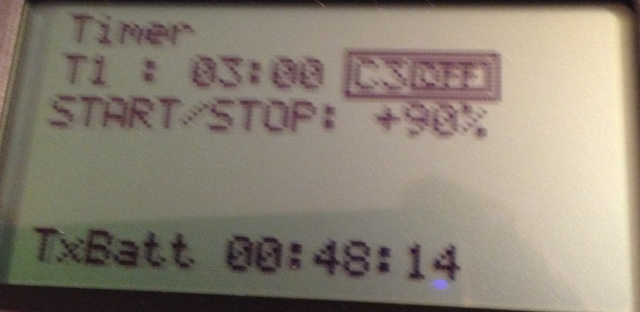 The timer screen now shows START/STOP: +90%
Shut off the transmitter. 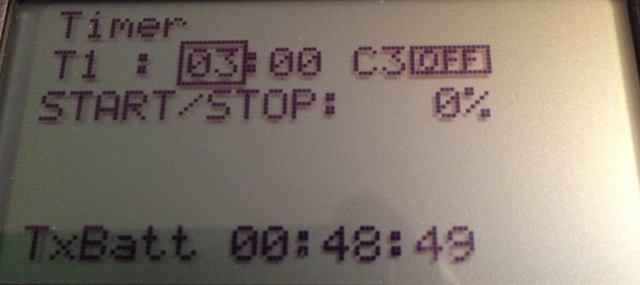 Turn the transmitter back on.
I believe that this is the reason that I could not identify why I was getting the timer working sometimes on a given model and then it not working sometimes. I had recently set up two planes with Tactic receivers, so I had the items I used to do the setups still on the bench. To see if the new TR625 receiver appeared to be working, I linked it to the new TTX660 transmitter. I use a toothpick to depress the link button in the Tactic receivers. Linking is EXTREMELY easy with Tactic receivers. 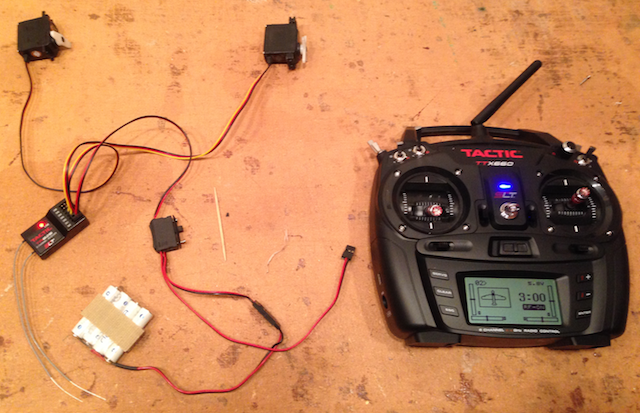 I like to do this procedure on the bench using a 4.8V NiMH pack and switch harness, but it is easily done using an ESC as the source to power the receiver. I found that it did appear to be working, so it was added to my "stock" drawer. I removed the prop from the Simple Cub version 5 and linked the new TTX660 to it. I tested all the movable surfaces and motor. I double checked to see that the moveable surfaces were still in neutral for its maiden flight. Once I was sure everything was working the way that I wanted it to, I set the failsafe, which again is extremely easy to do with Tactic receivers. I tested the failsafe by turning off the transmitter. It worked as expected. I put the prop back on the Simple Cub motor and I was ready to do a range check. With both versions of my modified FT Simple Cubs set up on the transmitter and their TR625 receivers linked to the transmitter, I performed a 360 degree range check on both planes at home. The range check "button" is found in the RF OUTPUT menu. Both planes passed their range checks. Both planes have been continuously flown with this system, and it is working as expected, excellently. I highly recommend the Tactic radios, as long as Horizon Hobby keeps them available. I archived the TTX660 manual in Adobe Acrobat format incase it disappears from the Internet. A Vintage Antic Flies
At 9:27 AM on Sunday June 7, 2020 the maiden flight of Leroy "Gunny" Gunther's Proctor Antic went off flawlessly completing a 31.5 year journey. Gunny meticulously built control line stunt aircraft before exploring RC. About 25 years ago Art "Big Art" Adamisin called me asking if I could immediately come to Gunny's house to retrieve his modeling stuff. I never knew what the urgency was about. I pulled all of the seats out of the van and headed over. On my return home, every surface and cubic inch in my van was stuffed, including the dashboard. I could only see out of the driver's side of the windshield and the left rear view mirror. I could see nothing but airplanes out the back. If my memory is correct we we eventually sold his things at various swap shops. There was an almost finished Proctor ANTIC and a scratch built Henderson Longster from Model Aviation plans that I hoped to acquire. Not knowing how to price things I asked Art to establish a price. 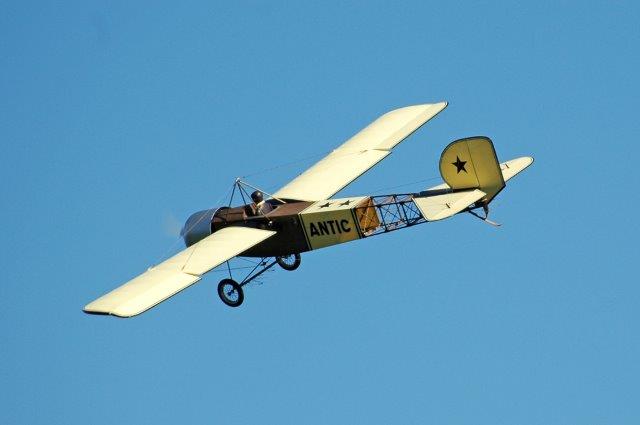 He looked at me indignantly and said, "Nothing. Who the hell else would have dropped everything to come over and clean out somebody else's workshop?" Big Art did have a way with words. I stored both airplanes at my house in Troy. We have been in our house in Rochester Hills for 22 years. Both the ANTIC and Longster moved here too. 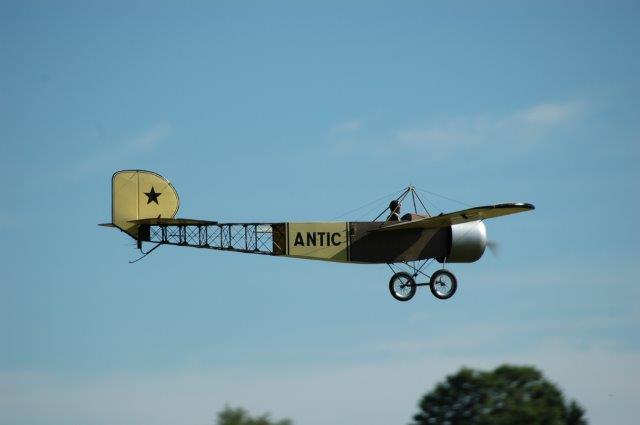 The ANTIC was covered. The fuselage was decorated as you see it. The wings needed to be painted SIG Cream. Big Art helped me with spraying the wings. Scale modeler Steve Sauger helped me with the rest of the trim. I always envisioned the ANTIC being converted to electric, especially with the ANTIC needing nose weight. With the encouragement of my son Chris, I got started on it about a month ago. It was the hardest project I have ever worked on. A brushed Astro Flight 40 with the 3:1 Super Box gearbox is coupled to a Astro Flight 205 speed control driving an APC 14 x 7 electric prop. Two 3S 2200mAh LiPo packs in series supply the power. I built up a special mount for the motor, speed control and batteries. 4 screws hold the mount to the firewall.The cowl is fiberglass, originally designed for a Top Flight Corsair. No screws are used to hold the cowl in place. A simple latch and 2 magnets do the work. Flying wires to 8 tiny turnbuckles and 2 drag lines hold the wings in place. With a little practice and a strict routine I can assemble it at the field in about 5 minutes. Funny how easy things are after you figure them out. Gunny kept things together so I had the plans and extra parts, all in the original Proctor box. Gunny started to build it on October 29, 1988. There was a note on the plans to that effect. It took 31.5 years for the ANTIC to see the skies. He paid $100.00 for it (original price was $154.95) from Joe's Hobby in Dearborn. Some would call the landing gear rusted. I say it has patina. Gunny, Art and Steve are gone but their skill, creativity and inspiration lives on. Just before take off I said out loud "Gunny, Art and Steve - This is for you!" I cried a lot getting it flying, remembering so much of each man. Both Chris and I flew it. Right now it is assembled and, at 81.5 inches, is taking up a major portion of the living and dining rooms along with 28 other aircraft, not including the "8 smalls" (under 3 ounce aircraft) that are ready for Mid-Am. There are other aircraft in the garage and basement plus a stash hanging from the ceiling at Nankin Hobby in Farmington. I have a Proctor float kit for it but I must admit I am a little tired of building. I forever thank my wife, Paula, for allowing virtually every horizontal surface and room in our house to be filled with aircraft. I thank my son, Chris, for his encouragement and ideas. My Dad would be utterly amazed at what Chris can do with any aircraft and his knowledge of aerodynamics and systems. Keith Shaw supplied immeasurable guidance on the power system, remembering and sharing information on the old brushed systems. George Maiorana and John Hakala helped with the pictures. One last note - After I inserted the arming plug Chris and I looked at each other. It had been a long time since we had heard nothing from an ESC and motor during start up. No tones, no melodies. Old time electric fliers will know what I mean. Joe Hass
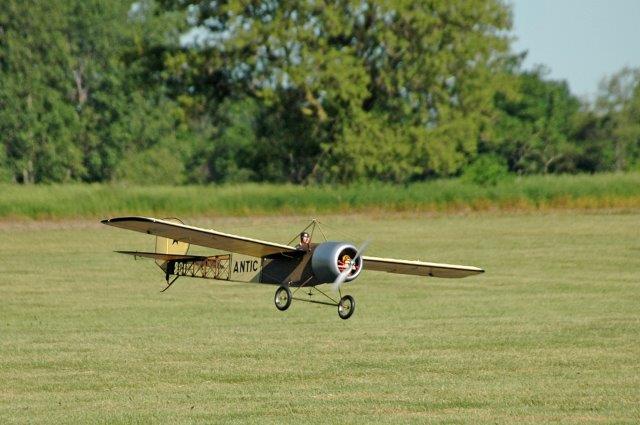 The January 2020 EFO Meeting The first EFO meeting of 2020 was held at Ken Myers' house on Wednesday, January 15. The first topic of discussion was the 36th Annual Mid-America Electric Flies to be held on July 11 and 12. We planned to have just one day of flying for awards, Saturday, July 11 and have Sunday be open electric flying. We had planned to have a field lunch available on Saturday and change the potluck to burgers, brats and beverages. (Because of the COVID-19 pandemic, only the flying plans remained the same.) Steve Labata noted that the UFO planned a memorial for Richard Utkan on Saturday, September 19, at about 11. (There has been no word as to whether or not this event will still take place.) Steve has been designing a new sport plane using Wing Helper and Dev fuse. He has purchased a CNC machine and is cutting his own parts. The CNC machine is router based and cost about $1800. It has a 32" x 16" bed. (The model produced from Steve's work can be seen in the June 2020 Ampeer.)
The photos show Steve's CAD drawings and some of the CNC cut parts. The Flitetest Community Based Organization (CBO) was discussed, and whether or not it can be affective. It was also noted, that unlike Flite Test, the AMA does not seem to piquing the interest of youth like Flite Test seems to be doing. Dave Stacer shared his new clamp-on meter. It is a Unity UT210E. He noted that he finds it very handy. 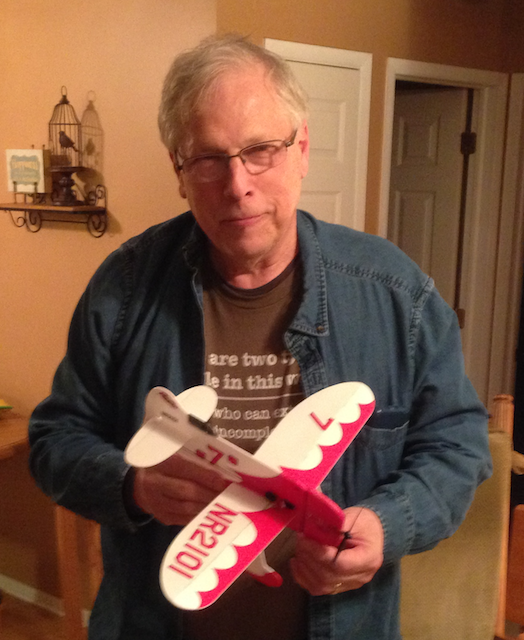
Roger with his tiny GeeBee Roger Wilfong showed off his Minimum RC GeeBee. It is available from many online suppliers. He bought it with the little tiny servos and motor and recommends a small receiver. It is very difficult to trim to fly well. It comes all white, but the red trim comes with it. To launch it it takes only a gentle toss. The CG is critical. The direct drive motor really sucks amps. It gets only about 4 minutes of flight time. It uses a single cell 150/160mAh LiPo and has an itty bitty prop. Ken Myers removed the back from his recently purchased Jumper T16 transmitter and passed it around while Bruce Simpson's YouTube video review of the Jumper T16 was shown on the TV. Keith Shaw did not like the way the gimbals' Hall sensors works. He noted that any change, like being placed near another magnet, will cause the magnetic field to shift and move the stick centering. He noted there is a better Hall sensor that does not depend on the field, but on the pattern in the field. Ken noticed that while demonstrating the Model Setup menu using the Create Model GUI, Plane was no longer selectable. The problem didn't appear to be hardware related. The scroll wheel worked, but Plane could not be selected as there was no box around it. The Scroll wheel worked with the rest of menu. Ken also demonstrated using the transmitter with 6 planes, with five different brands of receivers in them. 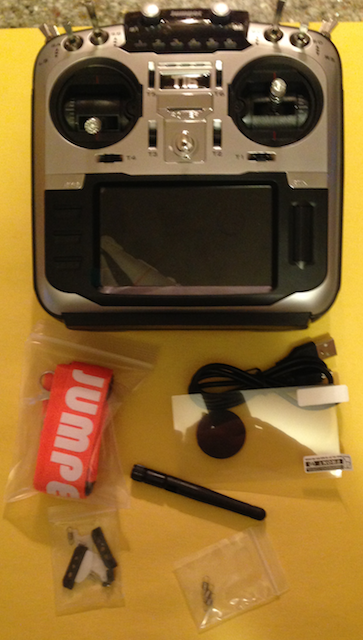 The photo shows the Jumper T16 and the items that were received with it. (It should be noted that the Jumper T16 was discontinued at the end of May 2020 and has been replaced by the Jumper T18.) It was a great meeting, and as usual there was plenty of sharing during the refreshments. To Reach Ken Myers, you can land mail to the address at the top of the page. My E-mail address is: KMyersEFO@theampeer.org |
